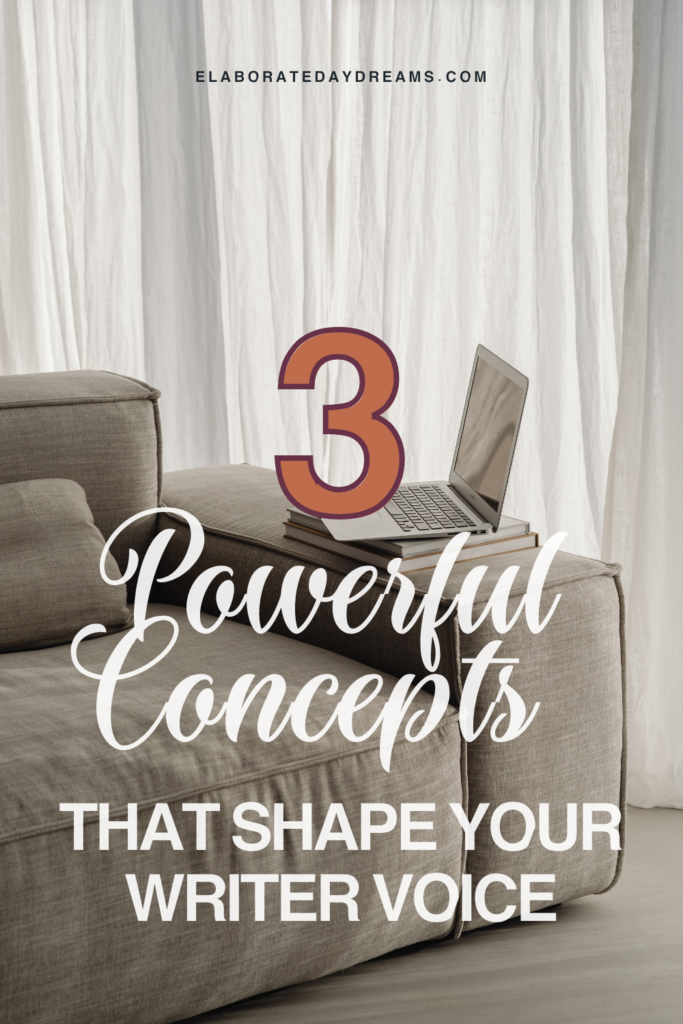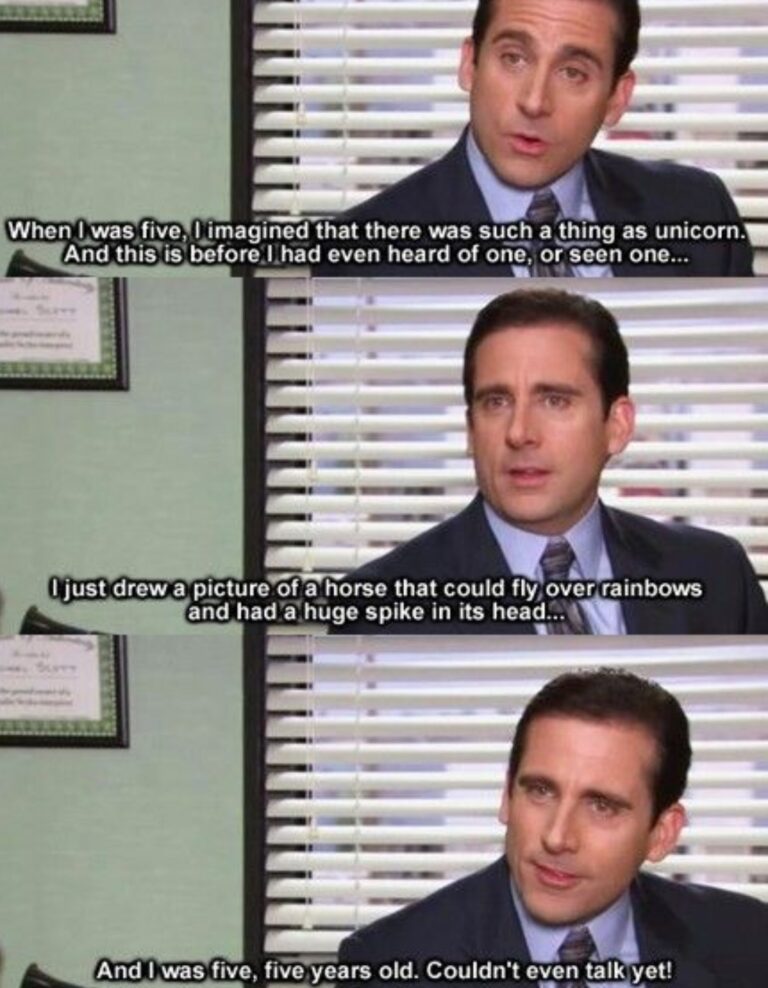3 Powerful Concepts That Shape Your Writer Voice
July 13, 2023
** This post was written specifically with fiction writers in mind, but we think the rules transcend to your brand voice, too.
We’re big cheerleaders about knowing at least 3 things as a fiction writer to shape your writing style:
- Knowing why you write fiction & what your goals are as an author.
- Understanding who your audience is, and what your genre is all about.
- Exploring other creative endeavors can be a powerful way to unlock revelations.
Today’s post will break those down, then bring it all together until why we think this formula is the secret sauce into growing as a writer. (Psst… did you see there are actually 5?) Let us know what’s missing in the comments.

3 Powerful Concepts That Shape Your Writer Voice
Writing fiction is deeply personal…
(…even if we’re lying to ourselves about it.)
Most authors you know will confirm they’ve had a big imagination since they could consciously think, but we can’t all be Michael Scott level genius. We’re shaped by our experiences, relationships, media we’ve consumed, the subject we’ve studied, the sleepless nights we’ve endured BECAUSE, truly—
We know it’s about more than wanting to hold your book.
There’s nothing wrong with wanting commercial success for your stories or just having a passion project, but recognizing that there’s more why you want to write in the first place can center you when you lose your place.
Is this about you, or your readers? Being honest with yourself about why you’re writing gives it purpose and direction.
Are you challenging societal norms and bringing a diverse voice to the mix? Writing the story you’ve always wanted to tell, but never had the guts? Maybe you’re the kind of writer who wants to captivate and entertain.
Share it with your people—or don’t—but unlocking the motivation behind wanting to write can drive you forward when you’re stuck in that inevitable slump.

I’ve met a handful of indie writers eager to self-publish their novel, and can confirm their top reason: “I just want to hold my book in my hands.”
Number one: I love that, and have only one minuscule problem with it, which brings me to number two. I think they’re fibbing, at least to me. Sure, I believe they want to have their physical book on the shelf, but they’re dreaming about dominating the self-publishing world with their debut novel.
Two things can be true when we’re working toward a goal, like wanting to improve our health while losing weight. But most of us will lose motivation if we pretend we’re only doing it to feel healthier. We want those fringe benefits, and we want them bad.
So, to wrap up my first point, let me repeat something I said multiple times in the complimentary Showit Website Launch Guide: choosing a measurable goal can make a world of difference.
Defining your goals and understanding the driving force behind them grants you freedom to make strategic choices, and tracking something you may or may not control. Ex: while I can work toward beefing up my e-mail subscriber list, I can’t/don’t want to make people join it, but what I can control is my efforts into gaining 500 subscribers in the 4th quarter of 2023.
Fun take you may or may not have thought of from a woman living with ADHD (whose executive function is a laughable disaster some days): Working backward from a lofty result ahead can be juuuust the motivation you need to get started.
Psychographics? 🤔
When I first heard the term psychographics, I didn’t know if I loved it or was just confused. I think both. I think it’s still both for me. As Hotjar puts it:
(Demographics + psychographics) x buyer behavior = actionable buyer persona
Beyond basic demographics like age and gender lies the lofty art of predicting behavior and preferences from your readers’ interests, preferences, values, and aspirations. I’m still chewing on this Gen Z insight about their generation’s true relationship with brands beginning at purchase.
There are endless exercises in getting into the head of your reader, but this post is all about the motivation behind our writer life. While we’re all individuals shaped by nature and nurture, there is significant evidence that immersing yourself into the world of your audience can give you valuable insights into what they love and hold dear.
That allows writers to craft characters, themes, and narratives that resonate deeply with their readers. You can use that to create emotional connections that hook them from page one.

Embrace the tropes to enhance your writer voice.
Every genre has its own set of rules, themes, and tropes, and pop culture sometimes throws the term cliche around like it’s a four-letter word.
Boundaries can be suffocating, but parts of them are freeing. To create beloved stories, authors embrace the nuances of their genre. Do you know why so many romance readers adore forced proximity? Because they know what to expect, and they can’t freaking wait for there to be only one bed!
BONUS: Understanding the ins and outs of what’s expected, they’re able to subvert expectations and breathe fresh life into familiar themes. The theme or expected plot might still be there, but the writer can nudge the boundaries, leaving their audience thrilled with the fresh perspective on a familiar fave.
BONUS Pt. II: Writers adhering to the rules of their genre score points with their readers and potentially the industry. A young adult romance book won’t find success as a YA romance if the word count is 120,000 words and one half of the duo dies. (Why? Because romance novels guarantee a happy ever after [or HAE for now], and the word caps at about 80-90k words].
If you can’t write, work.
I’ve been with my husband for over half my life, starting at age sixteen. Even though he occasionally drives me nutty, he’s also my champion, best friend, and the person who knows me best. One of the incredible parts of finding your lobster (hah) at a young age is that you grow together.Are you wondering how I’m about to wrap this up?
A couple of years ago, I slid into the world of digital art. I’ve been interested in art forever, but I can barely draw a straight line. (My oldest brother likely claimed it all at birth; he’s super talented.)It took months of studying, starting projects over and over, and sharing embarrassing attempts with people on social media before I improved. When Josh commented one day that my creativity had exploded in the past year, I was tickled pink. Me? Me do good?
After a certain age, we might think we’ve settled into our lives and capabilities, but I refuse to believe I’ve peaked. There’s something about being bold, bravely sharing your attempts with others, that sparks change in you. And, it seems, maybe the people who witness it, too. I’ll never be up to the caliber of those with that natural eye, but who cares? It’s fun.
So, let me wrap this post up and ask you: Do you have another medium to explore that will push you out of a writing slump when you’re uninspired or stuck in a scene?
Stop forcing it. If you can’t write, then work on something else:
- Design a character sheet,
- Throw together a TikTok edit,
- Create a social media post from the POV of your favorite side character, or
- Explore your author branding.
- Don’t let writer fatigue & kill your dreams of becoming an author. Whatever you decide on, take your mind off what you can’t do, and find something you can do. If you can’t write, work.
** This post was written specifically with fiction writers in mind, but we think the rules transcend to your brand voice, too.
We’re big cheerleaders about knowing at least 3 things as a fiction writer to shape your writing style:
- Knowing why you write fiction & what your goals are as an author.
- Understanding who your audience is, and what your genre is all about.
- Exploring other creative endeavors can be a powerful way to unlock revelations.
Today’s post will break those down, then bring it all together until why we think this formula is the secret sauce into growing as a writer. (Psst… did you see there are actually 5?) Let us know what’s missing in the comments.

3 Powerful Concepts That Shape Your Writer Voice
Writing fiction is deeply personal…
(…even if we’re lying to ourselves about it.)
Most authors you know will confirm they’ve had a big imagination since they could consciously think, but we can’t all be Michael Scott level genius. We’re shaped by our experiences, relationships, media we’ve consumed, the subject we’ve studied, the sleepless nights we’ve endured BECAUSE, truly—
We know it’s about more than wanting to hold your book.
There’s nothing wrong with wanting commercial success for your stories or just having a passion project, but recognizing that there’s more why you want to write in the first place can center you when you lose your place.
Is this about you, or your readers? Being honest with yourself about why you’re writing gives it purpose and direction.
Are you challenging societal norms and bringing a diverse voice to the mix? Writing the story you’ve always wanted to tell, but never had the guts? Maybe you’re the kind of writer who wants to captivate and entertain.
Share it with your people—or don’t—but unlocking the motivation behind wanting to write can drive you forward when you’re stuck in that inevitable slump.

I’ve met a handful of indie writers eager to self-publish their novel, and can confirm their top reason: “I just want to hold my book in my hands.”
Number one: I love that, and have only one minuscule problem with it, which brings me to number two. I think they’re fibbing, at least to me. Sure, I believe they want to have their physical book on the shelf, but they’re dreaming about dominating the self-publishing world with their debut novel.
Two things can be true when we’re working toward a goal, like wanting to improve our health while losing weight. But most of us will lose motivation if we pretend we’re only doing it to feel healthier. We want those fringe benefits, and we want them bad.
So, to wrap up my first point, let me repeat something I said multiple times in the complimentary Showit Website Launch Guide: choosing a measurable goal can make a world of difference.
Defining your goals and understanding the driving force behind them grants you freedom to make strategic choices, and tracking something you may or may not control. Ex: while I can work toward beefing up my e-mail subscriber list, I can’t/don’t want to make people join it, but what I can control is my efforts into gaining 500 subscribers in the 4th quarter of 2023.
Fun take you may or may not have thought of from a woman living with ADHD (whose executive function is a laughable disaster some days): Working backward from a lofty result ahead can be juuuust the motivation you need to get started.
Psychographics? 🤔
When I first heard the term psychographics, I didn’t know if I loved it or was just confused. I think both. I think it’s still both for me. As Hotjar puts it:
(Demographics + psychographics) x buyer behavior = actionable buyer persona
Beyond basic demographics like age and gender lies the lofty art of predicting behavior and preferences from your readers’ interests, preferences, values, and aspirations. I’m still chewing on this Gen Z insight about their generation’s true relationship with brands beginning at purchase.
There are endless exercises in getting into the head of your reader, but this post is all about the motivation behind our writer life. While we’re all individuals shaped by nature and nurture, there is significant evidence that immersing yourself into the world of your audience can give you valuable insights into what they love and hold dear.
That allows writers to craft characters, themes, and narratives that resonate deeply with their readers. You can use that to create emotional connections that hook them from page one.

Embrace the tropes to enhance your writer voice.
Every genre has its own set of rules, themes, and tropes, and pop culture sometimes throws the term cliche around like it’s a four-letter word.
Boundaries can be suffocating, but parts of them are freeing. To create beloved stories, authors embrace the nuances of their genre. Do you know why so many romance readers adore forced proximity? Because they know what to expect, and they can’t freaking wait for there to be only one bed!
BONUS: Understanding the ins and outs of what’s expected, they’re able to subvert expectations and breathe fresh life into familiar themes. The theme or expected plot might still be there, but the writer can nudge the boundaries, leaving their audience thrilled with the fresh perspective on a familiar fave.
BONUS Pt. II: Writers adhering to the rules of their genre score points with their readers and potentially the industry. A young adult romance book won’t find success as a YA romance if the word count is 120,000 words and one half of the duo dies. (Why? Because romance novels guarantee a happy ever after [or HAE for now], and the word caps at about 80-90k words].
If you can’t write, work.
I’ve been with my husband for over half my life, starting at age sixteen. Even though he occasionally drives me nutty, he’s also my champion, best friend, and the person who knows me best. One of the incredible parts of finding your lobster (hah) at a young age is that you grow together.Are you wondering how I’m about to wrap this up?
A couple of years ago, I slid into the world of digital art. I’ve been interested in art forever, but I can barely draw a straight line. (My oldest brother likely claimed it all at birth; he’s super talented.)It took months of studying, starting projects over and over, and sharing embarrassing attempts with people on social media before I improved. When Josh commented one day that my creativity had exploded in the past year, I was tickled pink. Me? Me do good?
After a certain age, we might think we’ve settled into our lives and capabilities, but I refuse to believe I’ve peaked. There’s something about being bold, bravely sharing your attempts with others, that sparks change in you. And, it seems, maybe the people who witness it, too. I’ll never be up to the caliber of those with that natural eye, but who cares? It’s fun.
So, let me wrap this post up and ask you: Do you have another medium to explore that will push you out of a writing slump when you’re uninspired or stuck in a scene?
Stop forcing it. If you can’t write, then work on something else:
- Design a character sheet,
- Throw together a TikTok edit,
- Create a social media post from the POV of your favorite side character, or
- Explore your author branding.
- Don’t let writer fatigue & kill your dreams of becoming an author. Whatever you decide on, take your mind off what you can’t do, and find something you can do. If you can’t write, work.